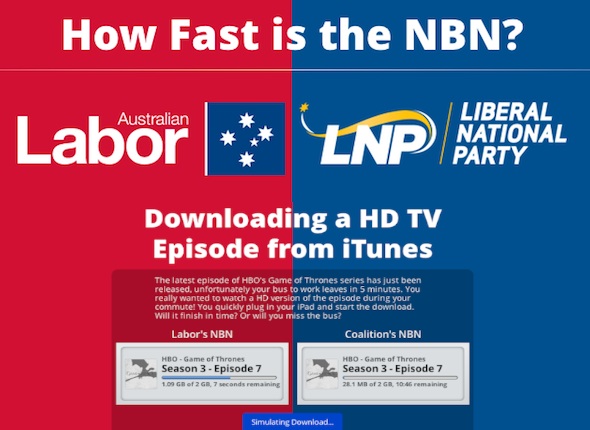Pub Politics :: Decrypting the NBN
May 13th 2013
FBi Radio
You’re reading a blog, good for you! I’m guessing that means you’re into this whole internet thing that’s been going on. It’s okay I guess, what with the music, Facebook, the widespread intelligent discussion of Game of Thrones…
But is the internet important enough for you to vote on it?
Well, probably not if the poll was held online. Without a National Broadband Network, upload traffic would slow speeds to a crawl and the election could drag into early 2014.
Nothing about the NBN conversation is running smoothly at the moment – as Senator Stephen Conroy found while frantically clicking ‘refresh’ on his browser at the recent Sydney media launch. So we thought we might have a look at some of the issues slowing the data down.
Infrastructure
As both parties attempt to score points for their NBN plans, most Australians just want to know how much, how fast and when they’ll get faster Youtube clips.
But that’s not the point of the NBN, and you might just scare Tony back into his old anti-NBN thinking talking like that. Because the National Broadband Network is an infrastructure project designed to:
There’s already 54,000 people in Australia today using the NBN. Unconfirmed reports suggest that it’s so fast they’re already downloading Season 4 of ‘Game of Thrones’.
Faster’s Better Right?
Seems like everyone’s promising something faster when it comes to the NBN. Perhaps the first and most important thing to note is that any NBN represents an improvement on the current situation. In 2011 Gizmodo Australia reported average download speeds of 348 KBps. When the NBN finally rolls out we are being promised speeds between 25MBps up to 1GBps (fast!)
Labor has said that they will deliver faster download speeds by way of fibre optic cables right through your letterbox and up through your toilet. The Liberals, however, have said it might save a few bucks if they just go fibre to the nearest public convenience and then a copper carrier pigeon lugs the data the rest of the way.
To illustrate “the large performance differential of the Labor and Coalition NBNs”, James Brotchie built a website called How Fast is the NBN? It portrays a far swifter Labor NBN for both upload and download speeds.
But, somehow, the Coalition promise they can deliver the whole system faster. Two years faster! That’s shorter than most teenage engagements…
Huh, Uploads?
One thing we’re not hearing a lot about in all the NBN discussion is what upload speeds will be available. Uploads become really important when you start doing stuff, instead of just watching stuff. From what I could find, upload speeds are going to be adjustable on a user-pays basis; faster than today, but it’ll cost you.
Money Matters
Getting the NBN we want is not going to be cheap. Sure, you can score free WIFI here and there these days, but whichever NBN plan you prefer is going to cost Australians billions of dollars.
The policy being spruiked by the Coalition also promises to be cheaper. They are emphasising fiscal responsibility by only developing speeds that will be utilised at the moment (ie: slower). Whether this leaves us short in the future is yet to be seen. Certainly we can expect more users-pays access, especially if you want fiber right up your home.
Innovation and Future-Proofing

FBi without an NBN
Nobody’s died of slow internet speeds yet (apologies Call of Duty fans, I see you waving). As we become increasingly inured to our online existence, our work and productivity will likewise be increasingly tied to competitive broadband speeds. Here at FBi we wouldn’t last too long if we relied on you all listening to us on crystal radios.
The proof of the NBN pudding will be in how it tastes. Many critics suggest we already have plenty of capacity for email, Facebook, Youtube… all the stuff we’re doing now. This attitude severely curtails innovation and future growth; the point of any infrastructure development.
On the horizon E-health and education are just two sectors touted as potentially huge growth areas as we have access to faster broadband.
The point is that we are not operating in a worldwide vacuum. As other countries develop their infrastructure, Australia risks being left behind.
Probably the most important function of the NBN is the one that hasn’t been thought up yet.
That toddler in front of you on the bus glued to her mum’s tablet? She could be the innovator that’s takes our online lives to the next level.
If she has the infrastructure to support it…
How Fast is the NBN | Andrew Pople




